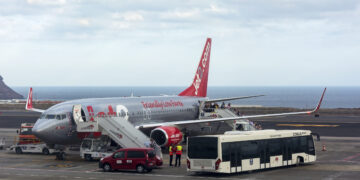From December 1, bars and cafes in Santa Cruz will be required to have waste bins on their terrace tables. The Chicharrero City Council, through its Public Services department, has strengthened the municipal regulations regarding the Management and Cleaning of Public Spaces for a Circular Economy. Consequently, from this date, kiosks, bars, restaurants, and other establishments situated in areas with significant foot traffic must provide certified containers at each table for waste disposal. This measure aims to prevent littering and enhance the environmental sustainability of the city.
The mayor, José Manuel Bermúdez, stated, “We are dedicated to environmental protection and sustainability, which involves implementing tangible actions that help reduce waste and improve the quality of life for both residents and visitors. Our goal is to regulate waste management within establishments while fostering a greater collective awareness regarding our shared responsibility in safeguarding the urban environment.”
Additionally, the Councillor for Strategic Planning, Environmental Sustainability and Public Services, Carlos Tarife, elaborated that “this initiative is crucial for maintaining a tidy and orderly city, both during and after various activities, and it will also enhance access to recycling points.” He further explained that “we are working towards establishing a more sustainable urban model in which businesses and citizens work together to keep our public areas free of litter and mindful of the environment.”
The containers must consist of durable materials and feature a lid to prevent waste spillage, while their size and weight should be suitable for the small volumes of waste produced at terrace tables. Furthermore, they must align with each establishment’s corporate branding and be conveniently placed for patrons. Establishment owners will be accountable for the cleaning and upkeep of these containers.
Monitoring
The newly implemented municipal regulations will primarily focus on areas that attract the highest tourist footfall, where numerous terraces and businesses are concentrated within public spaces. Moreover, the City Council will conduct an inspection and monitoring plan to ensure adherence to these regulations, which will take effect on December 1.
This initiative stemmed from municipal inspections in high tourist traffic zones, such as Marítima and Anaga avenues, Rambla de Santa Cruz, and the avenues de la Asunción and San Sebastián. These inspections revealed that certain dining establishments were failing to meet their obligations to maintain cleanliness around their terraces, as mandated by the regulation.
Through this initiative, Santa Cruz is taking another significant step towards achieving a cleaner, more efficient, and environmentally-friendly city, aligning itself with the principles of the circular economy.
















